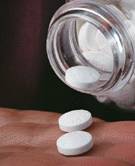
MONDAY, Aug. 24, 2015 (HealthDay News) — Regularly taking low-dose aspirin or other common pain relievers may lower long-term risk of colon cancer, new research suggests.
Men and women who took low-dose (75 to 150 milligrams) aspirin for five years or more saw their risk of colon cancer drop by 27 percent. And taking non-steroidal anti-inflammatory drugs (NSAIDs) such as ibuprofen for that long was linked to a 30 percent to 45 percent drop in colon cancer risk, the study found.
“The protective association is certainly amazing, and it’s a good example of how everyday drugs can have unexpected benefits,” said study co-author Dr. John Baron, a professor of medicine in the University of North Carolina School of Medicine, in Chapel Hill.
“But there are also potential risks,” said Baron, who urged the findings be viewed with care.
“I don’t think we should imply or recommend that these medications be taken for cancer prevention without working closely with a physician,” he said.
The study did not assess the potential impact of high-dose aspirin, and no protective benefit was seen for irregular or short-term users of either low-dose aspirin or other NSAIDs.
And the study did not prove that the use of painkillers reduced the risk of colon cancer, just that there was an association between the two.
In the United States, NSAIDs include over-the-counter Aleve (naproxen), Advil and Motrin (both ibuprofen), and prescription drugs such as Celebrex and high-strength Motrin.
Baron emphasized that the drugs were taken continuously for years before any cancer-preventive benefits were realized. “For aspirin, you would have to take it fairly consistently, meaning at least every other day, for at least five to 10 years for the protective effect to even begin to appear,” he said.
“That’s a significant amount of time for side effects to accumulate, all without getting any benefit,” he said.
Potential side effects include gastrointestinal bleeding with aspirin, and heightened risk for heart attack and stroke with long-term use, or high-dose use, of NSAIDs, according to the U.S. Food and Drug Administration.
In the United States, colon cancer is a leading cause of cancer deaths, according to the U.S. Centers for Disease Control and Prevention.
For the study, published in the Sept. 1 issue of the Annals of Internal Medicine, investigators sifted through several Danish cancer databases to gather the health histories of more than 10,000 colon cancer patients diagnosed between 1994 and 2011. Patients were between the ages of 30 and 85.
Medical records were stacked up against aspirin and non-aspirin NSAID consumption patterns — this was possible because in Denmark most NSAIDs and low-dose aspirins are obtainable by prescription only.
A comparison of cancer patients with more than 100,000 cancer-free Danes revealed that regular, long-term use of low-dose aspirin and NSAIDs seemed to confer long-term protection against colon cancer.
The biggest benefit was linked to NSAIDs with the highest degree of so-called COX-2 selectivity. Celebrex is one such drug.
That said, the U.S. Food and Drug Administration requires a “black box” warning — its strongest drug-related warning — on Celebrex packaging to alert users to the heightened risk for heart attack or stroke.
The investigators said the finding of a low-dose aspirin benefit was qualified by the fact that only 2 percent to 3 percent of the study patients actually took low-dose aspirin continuously for many years. (Many doctors recommend patients take low-dose aspirin to help prevent heart attack).
Still, Baron said the findings are “hopeful, because it means that we’re understanding cancer better and better.”
That sentiment was seconded by Dr. Andrew Chan, an associate professor of medicine at Harvard Medical School in Boston.
“The question now is really whether aspirin can also help prevent other cancers as well,” Chan said. “We need more research, but there’s already some evidence that that might be the case. And we now have a substantial and very consistent body of evidence showing that aspirin can prevent colon cancer.”
For certain people, Chan said, “like those with a predisposition to colon cancer, the risk-benefit analysis might make a lot of sense.”
More information
There’s more on colon cancer at the American Cancer Society.
Copyright © 2026 HealthDay. All rights reserved.

